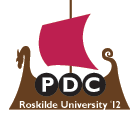| PAPERS | TUESDAY 15:30-17:00 | GRAND AUDITORIUM |
Empowerment
Session chair: Jeanette Blomberg, IBM Almaden Research Center
Impediments to user gains: Experiences from a critical participatory design project
Claus Bossen, Aarhus University
Christian Dindler, Aarhus University
Ole Sejer Iversen, Aarhus University
Abstract. Actual studies of user gains from involvement in design processes are few, although a concern for user gains is a core characteristic of participatory design (PD). We explore the question of user gains through a retrospective evaluation of a critical PD project. We conducted ten qualitative interviews with participants in a project aimed at developing technology to foster engaging museum experiences and rethinking cultural heritage communication. Despite the use of established PD techniques by experienced PD practitioners, a significant number of frustrations relating to the PD process were prominent in the study. Based on these findings, we provide an analysis of impediments to user gains in PD projects in terms of unresolved differences between aims, absence of a clear set-up for collaboration, and different conceptions of technology.
Disentangling power and desicion-making in participatory design
Tone Bratteteig, University of Oslo
Ina Wagner, University of Oslo
Abstract. This paper uses the example of a participatory design project in support of urban planning to analyse the complexity of design decisions. A set of design decisions is described and discussed, showing who made decisions on what. We discuss big decisions and small decisions, decisions internal to the project and related to the outside world, and decisions that might be called non-decisions. A conceptual framework on power is applied for understanding decision-making, power and conflict in Participatory Design projects. We discuss the concept of power, making distinctions between sources of power (among them expert knowledge, resource allocation, values, and interpretations); as well as between various mechanisms guiding decision-making: power, influence, trust and seeking understanding.
Words are not enough: Empowering people with aphasia in the design process
Julia Galliers, City University London
Stephanie Wilson, City University London
Abi Roper, City University London
Naomi Cocks, City University London
Jane Marshall, City University London
Sam Muscroft, City University London
Tim Pring, City University London
Abstract. This paper explores the issue of empowering participants in design when they do not have the language skills integral to many design methods. We describe the challenges, solutions reached and lessons learned whilst employing a participatory design (PD) approach in the development of a prototype computer therapy tool for people with aphasia, a communication disorder. Our approach was workshop based. During a series of participatory workshop sessions, five people with aphasia, employed as consultants, took part in game-playing activities followed by hands-on interaction with a series of iterative prototypes. The challenges we faced arose primarily from the consultants' difficulties with the production and comprehension of language, both textual and verbal, and with the retention of information. The strategies and techniques we devised to cope with these challenges evolved over the course of the workshop sessions. We discuss these and how to involve and empower users with cognitive impairments, in the context of a broadening scope of PD practices.
